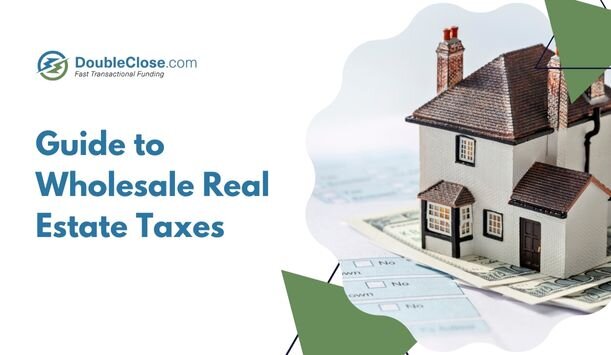
Made money from wholesaling last year? Then you’ll need to pay taxes on your earnings before a certain date.
Whether you assign contracts or execute wholesale real estate double closings, you must know your tax obligations. Self-employment taxes, deductions—if you don’t know what’s taxable and how to minimize liabilities, profiting from real estate deals may be tough.
The following guide explains wholesale real estate taxes and provides helpful strategies you can use this tax season.
What Are Wholesale Real Estate Taxes?
Whether you make a lot or a little moneywholesaling real estate, you’ll need to pay taxes on that income. Specifically, you’ll have to pay federal, state, and even local taxes, and you must comply with all rules and regulations.
It goes without saying, but the IRS considers profits from closing deals and assigning contracts taxable income. Why? Because wholesalers don’t own the properties they’re making money off.
What kind of tax is paid? Self-employment tax, and that’s because the IRS doesn’t consider the profit earned from wholesaling as passive income.
You’ll need to file correctly and pay what you owe, otherwise you may be penalized or audited. The latter especially should be avoided, as even a basic audit can cost a taxpayer $5,000-$7,000.
Do You Pay Taxes On Money Earned From Wholesaling Real Estate?
Of course! That said, the amount you owe depends on how much you made and your business’ structure.
Because wholesalers act as middlemen—connecting sellers with buyers—they avoid property-related taxes, most notably capital gains tax. However, wholesalers must report assignment fees and other profits as income.
Tax Forms For Real Estate Wholesalers
How you report your real estate wholesaling profits depends on your business’ structure. Below, we briefly explain some of the common tax forms:
| Form | Who Uses It | Purpose |
| Schedule C (Form 1040) | Sole proprietors & single-member LLCs | Report business income and expenses. |
| Form 1065 | Partnerships & multi-member LLCs | Report business income and expenses. |
| Form 1120-S | S-Corporations | Report business income and expenses. |
| Form 1099 | Wholesalers hiring subcontractors (over $600) | Report payments made to independent contractors. |
| W-2 | Businesses with employees (including S-Corp owners) | Report wages and benefits paid to employees. |
Even if you don’t receive a 1099, you’re still required to report all earned income. A tax professional can help you file everything correctly.
How To File Taxes As A Real Estate Wholesaler
Filing taxes as a real estate wholesaler can be complex, so working with a tax professional isn’t a bad idea. A Certified Public Accountant (CPA) can explain deductions, estimated tax payments, and relevant laws and regulations.
Sure, hiring an expert at the outset may seem like an extra expense, and it is,but doing so can save you time and money, and it’ll help you avoid stress.
Tax-Saving Strategies For Real Estate Wholesalers
Managing your tax obligations wisely is good for two reasons: you’ll avoid issues with the IRS and maximize profits. Here are some key strategies to consider:
Understand State And Local Taxes: Each state has its own tax code. If you do business in a particular state, make sure you’re familiar with its tax code. If you know what your tax obligations are in advance, planning for unexpected issues is easier.
Track Your Expenses: Maintain accurate records and keep track of business expenses. The amount you spend on marketing materials, transportation expenses—right it all down in a notebook or spreadsheet that’s easy to secure. The IRS recommends keeping the previous three years’ financial records.
Set Aside Money For Taxes: Rather than scrambling to pay taxes at the end of the year, set aside a portion every time you close a profitable deal. The amount you’ll need to withhold depends on your tax bracket, local and state tax rates, and your business structure.
Choose The Right Business Structure: Your business structure affects your tax liability. Sole proprietors and LLCs pay self-employment tax (15.3%) on their earnings. However, if you have an S-Corporation, you can pay yourself a salary, which means you won’t pay as much in self-employment tax.
Quarterly Tax Payments For Wholesalers
Since wholesaling is considered self-employment, you must make estimated tax payments throughout the year. The IRS requires quarterly payments on the following dates:
- April 15
- June 15
- September 15
- January 15 (of the following year)
Failing to pay on time can result in penalties, so it’s important to plan ahead.
Wholesaling Tax Deductions
One benefit of running a business is that you can deduct eligible expenses from your taxable income. Some common deductions for wholesalers include:
- Marketing and advertising costs
- Business use of a car or cellphone
- Subcontractor payments
- Legal, accounting, and professional services
- Business insurance
- Office rent or home office expenses
- Memberships and subscriptions
Final Thoughts On Wholesale Real Estate Taxes
Wholesaling real estate is a great way to earn money, but taxes are an unavoidable part of the business. If you understand your tax obligations and plan ahead, keeping more of your hard-earned profits will be a lot easier.
If you need funding for your next deal, check out DoubleClose.com. We provide wholesale transactional funding to wholesalers across the nation. Whether you need a small or large loan, we’ve got you covered! Contact our experienced team today to secure funding for your next transaction!
